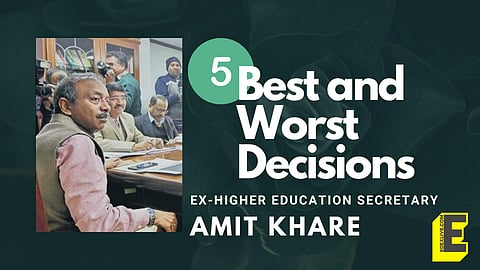

On Thursday, the Minister of Education Dharmendra Pradhan and others in the Ministry bid adieu to IAS Officer Amit Khare, the prolific Higher Education Secretary who oversaw India's tumultuous National Education Policy coming into effect. Khare's tenure was fairly popular and he made it to the news quite often. He also held the post when the ministry underwent a name change, from Ministry of Human Resource Development to Ministry of Education, and rose to prominence during the implementation of the new National Education Policy and when Dharmendra Pradhan replaced Ramesh Pokhriyal to become the new Minister of Education, in July.
As IAS officer K Sanjay Murthy replaces Khare to become the new HE Secretary, we took a look at a few of the decisions that the former Education Secretary made during his tenure — and whether people loved it or not:
Filling up reserved faculty positions that were vacant for years
Vacant faculty positions in higher education institutions, reserved for members from SC, ST, OBC and EWS categories have been an ongoing issue in the country. In August 2021, Khare had ordered the heads of the Central Higher Education Institutions (CHEIs) to fill up faculty positions lying vacant, especially the ones earmarked for SC, ST, OBC and EWS categories, in "Mission Mode" within a year.
Degrees with multiple entries and exit — from first year to the last
This was one of the provisions mentioned in the new National Education Policy. The policy said that instead of the current three-year undergraduate system for arts and science degrees, the structure is broken down into four years, where students can enter and exit at any point. Khare had linked this proposal as one of the “non-financial reforms” which require a “new way of thinking” rather than money to implement. In fact, this was one of the first provisions of the policy to be implemented in a few universities.
Conducting physical exams for NEET, JEE during the pandemic
A large number of student groups in the country were against conducting examinations during the pandemic. To be honest, 2020 and 2021 were not easy years for the Ministry of Education, having had to postpone key examinations multiple times. However, at one point in 2020, by August, Khare said that NEET and JEE could not be postponed any further as any delay will cause students to lose an academic year. This did not go well with students, who had filed multiple petitions seeking postponement until a majority is vaccinated.
Bringing the violent Jamia, JNU protests to an end after months
When Khare took charge as the HE Secretary, JNU students had been on a strike against the university's decision to hike fees. After Khare had met with the university Vice-Chancellor M Jagadesh Kumar, the fee hike was rolled back. However, he had not issued any concrete statement during the violence that happened in JNU and Jamia Millia Islamia in January 2020.
Making technical and engineering education in several people's mother tongues
In December 2020, the centre had set up a task force to impart technical education in one's mother tongue. Khare had later clarified that the centre has nothing against English, but did not want the language barrier to be a hurdle for a student.
